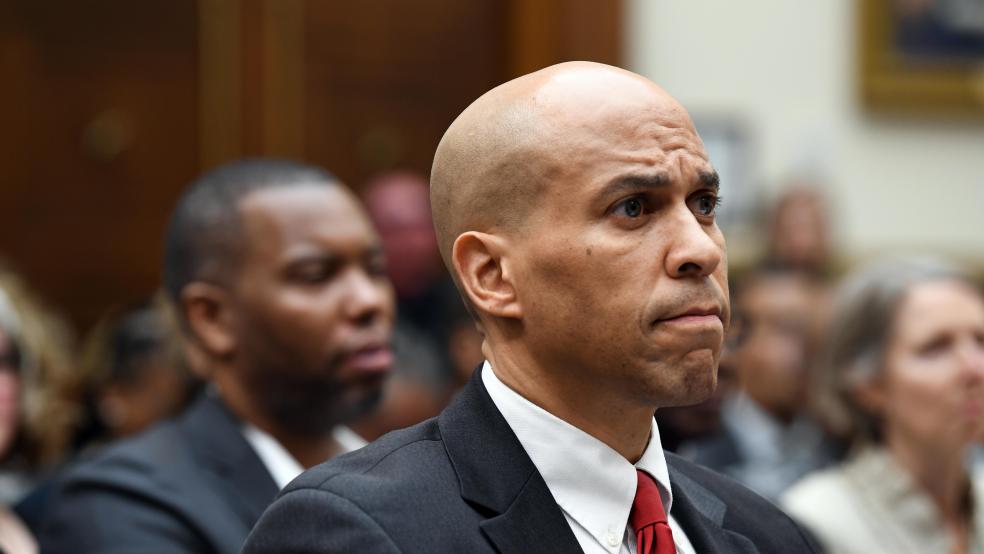The House held on Wednesday the first hearing in more than a decade on reparations – the idea that the descendants of slaves in the U.S. should receive some kind of compensation for the suffering experienced by their ancestors. Among those testifying were presidential candidate Sen. Corey Booker (D-NJ), writer Ta-Nehisi Coates and actor Danny Glover.
The purpose of the hearing: The Judiciary Subcommittee on the Constitution, Civil Rights, and Civil Liberties is debating H.R. 40, a bill sponsored by Rep. Sheila Jackson-Lee (D-TX), that would establish a commission “to study and consider a national apology and proposal for reparations for the institution of slavery, its subsequent de jure and de facto racial and economic discrimination against African-Americans, and the impact of these forces on living African-Americans, to make recommendations to the Congress on appropriate remedies ...”
The timing of the hearing: Wednesday is June 19, which is celebrated as “Juneteenth” in commemoration of the day the abolition of slavery was announced in Texas in 1865 and, more generally, the liberation of African-Americans in the former Confederate States of America.
The argument for: Sen. Corey Booker spoke in favor of the bill, citing a national failure to address “the root causes of a lot of the inequities” that exist in the U.S. The senator said the country has not yet confronted its long history of racism and white supremacy, and that establishing a commission to study the issue would provide an “historic opportunity to break the silence, to speak to the ugly past and talking constructively about how we will move this nation forward." With respect to reparations, the senator has proposed providing all American children with $1,000 “baby bonds,” supplemented every year, with the poorest children receiving larger amounts. Booker’s plan would address racial wealth disparities indirectly, with black children benefiting in greater percentages due to persistently high poverty levels in the black community.
The argument against: Ahead of the hearings, Senate Majority Leader Mitch McConnell (R-KY) criticized the idea, saying that he didn’t think “reparations for something that happened 150 years ago for whom none of us currently living are responsible is a good idea.” McConnell noted that the U.S. has passed civil rights legislation and “elected an African-American president,” and argued that it would be “pretty hard to figure out who to compensate” if a reparation system were put in place.
Coates, who sparked a renewed interest on the topic in 2014 with a piece titled “The Case for Reparations” published in The Atlantic, responded directly to McConnell in his testimony. “We grant that Mr. McConnell was not alive for Appomattox,” Coates said, but he “was alive to witness kleptocracy in his native Alabama and a regime premised on electoral theft. … He was alive for the redlining of Chicago and the looting of black homeowners of some $4 billion. Victims of that plunder are very much alive today."
The difficult details: While the hearing was about setting up a commission to analyze the issue, supporters of reparations have been discussing different options for how to pay them for years. The bill itself is named after the post-Civil War promise of “40 acres and a mule” for the former slaves – a promise that was quickly broken in the post-war South. Contemporary proposals for reparations range from sending out checks to the descendants of slaves to massive investments in African-American communities, including, for example, the historically black colleges.
Given the wide range of proposals, it’s hard to put a price tag on reparations, and estimates range from $17 billion to $5 trillion, CNN reports. But supporters of the idea argue that the price tag is secondary to the larger issues of historical responsibility and national identity.
What’s next: House Majority Leader Steny Hoyer (D-MD) said Democrats plan to bring the bill to the floor for a vote, though it has to pass the Judiciary Committee first. If the bill were to become law – which is unlikely, given Republican control of the Senate and White House – it would provide $12 million to study the issue.
For more on the debate:
- The Case for Reparations (Atlantic)
- The Impossibility of Reparations (Atlantic)
- People Are Again Talking about Slavery Reparations. But It's a Complex and Thorny Issue (CNN)
- The 2020 Democratic Primary Debate over Reparations, Explained (Vox)
- Where the 2020 Democratic Candidates Stand on Reparations (Axios)
- House Resolution 40 – Commission to Study and Develop Reparation Proposals for African-Americans Act


